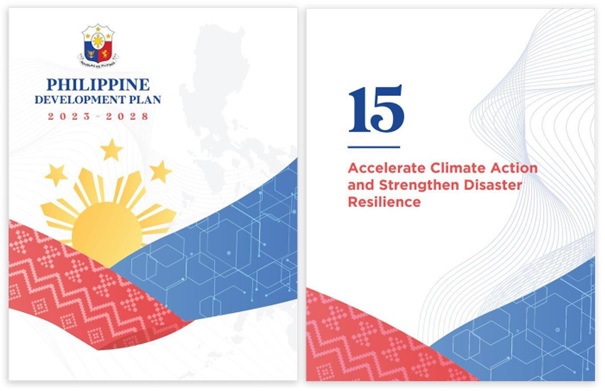
January 15, 2023 Sunday

The Philippine Development Plan (PDP) 2023–2028 and Chapter 15: Accelerate Climate Action and Strengthen Disaster Resilience
MANILA, 15 January 2023 – The Climate Change Commission (CCC) welcomed the inclusion of an accelerated climate change agenda in the Philippine Development Plan (PDP) 2023-2028 and pointed out that this will further strengthen the commitment of the Philippine Government to deliver on key climate actions.
CCC Vice Chair and Executive Director (VCED) Robert E.A. Borje cited the addition of an entire chapter on climate change in the PDP 2023-2028, Chapter 15: Accelerate Climate Action and Strengthen Disaster Resilience.
“The PDP Chapter 15 reflects the Philippine Government’s commitment and dedication to enhance the nation’s overall resilience to climate change and its impacts, putting a premium on the need for integrated and comprehensive climate action between and among government, partners, and all stakeholders,” VCED Borje said.
Chapter 15 of PDP 2023-2028 identifies the goal for communities, institutions, and the natural and built environment to be “more resilient to the impacts of natural hazards and climate change” by 2028.
To achieve this objective, Chapter 15 of PDP 2023-2028 identified the following strategies: 1) increasing climate and disaster risk resilience of communities and institutions, 2) enhancing ecosystem resilience, and 3) enabling transition to a low-carbon economy.
To support and operationalize PDP 2023-2028, the CCC is updating the National Climate Change Action Plan (NCCAP) and the Nationally Determined Contribution (NDC), strengthening the implementation of the National Climate Risk Management Framework (NCRMF), and developing the National Adaptation Plan (NAP).
These plans and frameworks provide convergence points for CCC to work with relevant government agencies on enhancing ecosystem resilience and enabling low carbon economy transition. Likewise, these plans and framework will allow the Philippine government to assess the required climate finance and investments on top of public resources for needed climate change actions.
Towards this end, 453.1 billion pesos has already been tagged for Fiscal Year 2023 for climate change expenditure by National Government Institutions (NGIs) to be used for adaptation and mitigation programs.
VCED Borje noted that the figure represents a significant 56% increase from the climate change expenditure tagged for Fiscal Year 2022 of 289.7 billion pesos, with 83% for adaptation and 17% for mitigation, “an indication of the priority of the Administration given to transformative climate change agenda, as laid out by President Ferdinand R. Marcos, Jr.”
VCED Borje also pointed out that it is essential that NGIs implement the adaptation and mitigation projects anchored on the following NCCAP thematic priorities: food security, water sufficiency, human security, environmental and ecological stability, sustainable energy, climate smart industries and services, and knowledge and capacity development.
The NCCAP was developed by CCC in consultation with relevant government agencies. This document outlines the country’s strategic direction from 2011 to 2028 as a response to the current situation and projected impacts of climate change.
To further build a robust climate change agenda for the Philippine Government, VCED Borje pointed out the need to likewise increase the compliance rate of NGI submissions and to further assess the progress of the projects based on the NCCAP.
“CCC is working very closely with the Department of Budget and Management to achieve the objective of increasing overall NGI submissions significantly,” said VCED Borje.
Data from CCC showed that for FY 2023, 210 of 316 NGIs submitted their Climate Change Expenditure Tagging compared to 145 for FY 2022, or an increase of 45%.
To increase climate and disaster risk resilience of communities and institutions, the CCC bared that it will ramp up its programs on further strengthening the capacity of LGUs and communities through the development, enhancement and submissions of Local Climate Change Adaptation Plan (LCCAP).
“The CCC will continue to further strengthen its public-private-community engagements to further develop public awareness and understanding on climate change, and further improve the quality of risk and vulnerability assessments,” VCED Borje said.
A total of 1,397 out of 1,715 LGUS submitted their LCCAPs in 2022 compared to 715 submissions from LGUs in 2021, showing a substantial 42% increase. The data represent a Year on Year submission rate increase of 40%.
“We will continue to work with the Department of Interior and Local Government in order to follow through with the target of having all 1,715 submit their LCCAPs,” said VCED Borje.
“We will intensify our partnerships with the private sector, CSOs and other stakeholders as necessary, as well as provide CCC technical support to build the capacities of our LGUs and enhancing LCCAPs, including in the areas of risk and vulnerability assessment, greenhouse gas inventory, and local climate budget tagging,” added VCED Borje.
VCED Borje also pointed out that climate change action has been “integrated in relevant sections of PDP 2023-2028 showing how climate change is an overarching governance issue that impacts and affects different development aspects and components for the nation.”
In addition to Chapter 15, climate change-related action points were reflected in PDP Chapters 2-Health, 3-Food Security and Nutrition and Social Protection, 4-Income-earning Ability, 5-Agriculture and Agribusiness, 6-Industries, 7-Services, 8-Research and development, Technology, and Innovation, 11-Fiscal Management, 12-Infrastructure, and 13-Peace and Security.
The PDP presents the six-year vision of President Ferdinand Romualdez Marcos Jr.’s administration towards an upper middle-income and low-carbon development, and climate-smart and climate-resilient Philippines.
The PDP was developed by the National Economic and Development Authority, with other government agencies and stakeholders.
For more information about climate change, visit https://climate.gov.ph and https://niccdies.climate.gov.ph/.